|
THE SOUTHERN HOME FRONT (continued)
|
CONFEDERATE CHILDREN CAUGHT IN THE THROES OF WAR
Carrie Berry was too young to recall events in her home town of
Atlanta when Georgia joined the Confederacy. But by 1864, when she
turned ten, Berry reported the toll the war had taken. On her birthday,
she revealed: "I did not have a cake. Times were too hard, so I
celebrated with ironing. I hope by my next birthday we will have peace
in our land so that I can have a nice dinner." Like those of many young
white girls of the Confederacy, her formerly prosperous parents were
unable to afford peace time luxuries. In 1864 Margaret Junkin Preston of
Virginia was shocked to report in a letter: "G. and H. at Sally White's
birthday party: H. said they had 'white mush' on the table; on inquiry,
I found out it was ice cream! Not having made any ice cream since
wartimes, the child had never seen any, and so called it white
mush."
Emma Le Conte reported in 1865 at the ripe old age of seventeen: "I
have seen little of the lightheartedness and exuberant joy that people
talk about as the natural heritage of youth. It is a hard school to be
bred up in and I often wonder if I will ever have my share of fun and
happiness." Some girls tried to look on the bright side. Amanda
Worthington in rural Mississippi confided: "I think the war is teaching
us some useful lessons—we are learning to dispense with many things
and to manufacture other."
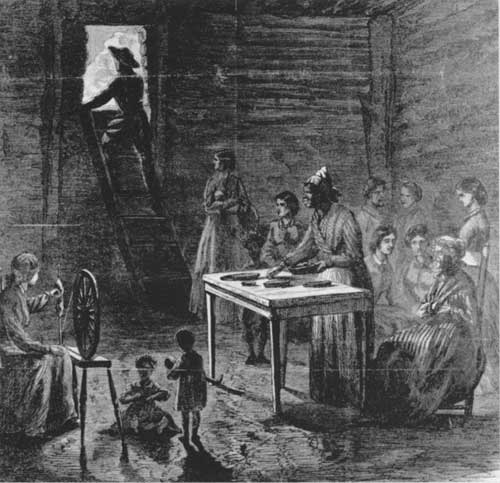
|
ATLANTA CIVILIANS HUDDLE IN A SHELTER DURING A FEDERAL BOMBARDMENT.
(COURTESY OF THE ATLANTA HISTORY CENTER)
|
The war also taught children some terrible lessons. Cornelia Peake
McDonald remembered her three-year-old wailing and clinging to her doll
Fanny, crying that "the Yankees are coming to our house and they will
capture me and Fanny." Another mother recounted a traumatic incident
during Sherman's march. When Union soldiers invaded her home, her
six-year-old daughter hid with her treasures—a bar of soap and her doll.
"One of the men approached the bed, and finding it warm, in a dreadful
language accused us of harboring and concealing a wounded rebel, and he
swore he would have his heart's blood. He stooped to look under the bed,
and seeing the little white figure crouching in a distant corner, caught
her by one rosy little foot and dragged her forth. The child was too
terror-stricken to cry, but clasped her little baby and her soap fast to
her throbbing little heart. The man wrenched both from her and thrust
the little one away with such violence that she fell against the
bed."
Such scenes created vivid memories and tales oft repeated. So
throughout the war, and the years to come, the mere mention of "Yankees"
might strike terror in Confederate children, stimulating fears that
haunted them in darkened bedrooms or around dying campfires.
|
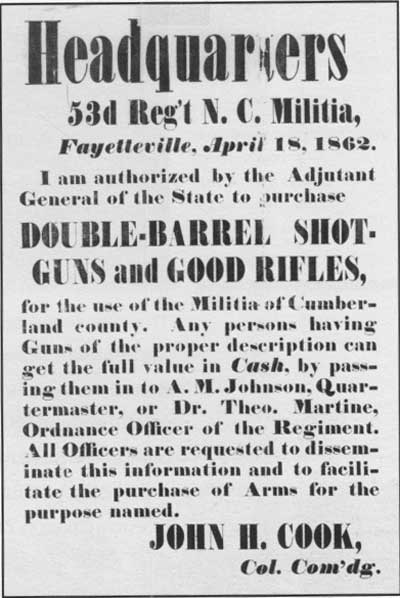
|
SOUTHERN COMMANDERS HAD TO SEEK WEAPONS FROM CIVILIAN SOURCES TO KEEP
THEIR TROOPS ARMED. (UNIVERSITY OF GEORGIA LIBRARY)
|
By 1864, when plantation mistress Clara Bowen was joined by her
husband for a week's furlough, she hoped he would not return to the
front and wrote to a friend: "Do not call me unpatriotic, Alice! I am
sure farmers are as necessary to our suffering country as soldiers. Food
and clothing must be made for the army as well as for the women and
children—starvation would be a more powerful foe than those we are
now contending with." By the time Bowen wrote from Ashtabula, South
Carolina, southern agriculture was already in ruins.
African American labor was being spirited away for the Union
cause—men as soldiers and women as cooks and laundresses. African
Americans also served as nurses in government hospitals, drivers of
supply wagons and ambulances, and cooks and valets within Confederate
camps—all slaves donated or supervised by masters. Most
important, the War Department could and often did have the authority to
impress slave labor into service. Louisa McCord Smythe recalled that her
family slaves were requisitioned in wartime Carolina.
Slaves remained at the root of the problem during the prolonged
battle for southern independence. Only in the last few weeks of the war
was the Confederate government willing to consider arming blacks in a
desperate bid to continue the losing battle. But by as early as 1863 the
floodgates of freedom had opened wide to African Americans who seized
the opportunity to escape masters. This disintegrating process
undermined the resolve of Confederates, especially non-slave owners who
formed the majority of the fighting force. For those left behind on
plantations, the process was even more painful to witness, as the spirit
of emancipation created not so much a tidal wave of resistance as a
strong and constant flow that washed over the South, eroding
slaveholders' power with the sands of time, day by day.
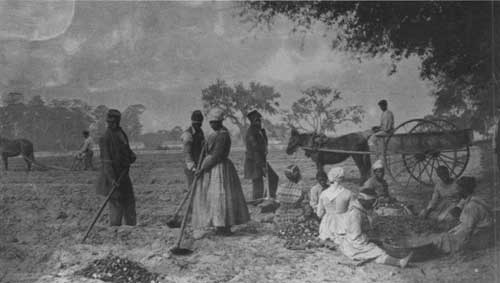
|
EMANCIPATED AFRICAN AMERICANS WORKING AS FREE LABOR IN THE FIELDS OF
SOUTH CAROLINA. (WESTERN RESERVE HISTORICAL SOCIETY)
|
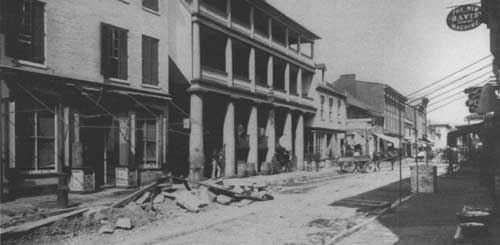
|
WINCHESTER, VIRGINIA—A TOWN THAT CHANGED HANDS FIFTY-TWO TIMES
DURING THE WAR. (USAMHI)
|
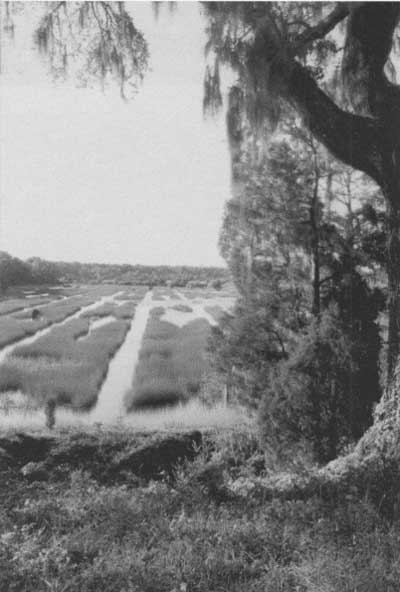
|
WITHOUT SLAVES, MANY SOUTHERN FIELDS AND PLANTATIONS WENT UNTENDED. (LC)
|
The weakening of the Confederacy was most visible in those areas of
the occupied South where escaped slaves, contrabands settled with
families and expropriated Confederate lands, with the blessings of the
federal government which leased property to blacks. On the South
Carolina Sea Islands, a thriving community was established, what
historian Willie Lee Rose has called a "rehearsal for Reconstruction."
When federals conquered and secured the region in 1862, a community of
ten thousand blacks were left behind. Many northern teachers moved in,
including a young woman born into a prominent free black family in
Philadelphia, Charlotte Forten. Forten had been educated in Salem,
Massachusetts, and become a teacher herself. She felt excited by the
challenge of traveling south to help the freedpeople and settled in at
St. Helena Island, the lone black among the colony of northern teachers.
In May 1864 the Atlantic Monthly published a two-part article
chronicling her experiment, "Life on the Sea Islands," which provides a
vivid record of this dramatic episode. She found exceptional pupils: "I
wish some of those persons at the North who say the race is hopelessly
and naturally inferior could see the readiness with which these
children, so long oppressed and deprived of every privilege, learn and
understand." As this experiment proved successful, federal authorities
sold some of the sea island property to blacks during auctions for
unpaid taxes.
Another successful experiment was conducted at Davis Bend,
Mississippi, on land owned by the family of the Confederate president.
When Jefferson Davis's brother was forced to abandon his plantation in
1862, he was unable to convince his slaves to accompany him, and when
Union troops arrived, blacks had both expropriated the Big House and
managed to run the place efficiently. By 1865 these self-sufficient
African Americans turned the place into what General Grant called "a
negro paradise."
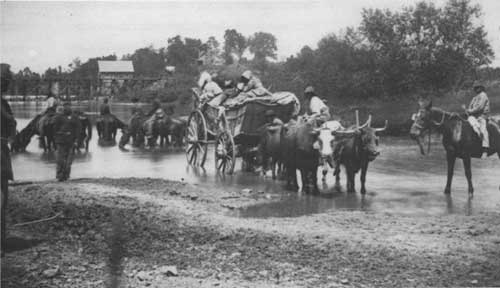
|
"CONTRABANDS" SELF-LIBERATED SLAVES FOLLOWING POPE'S TROOPS. (LC)
|
Many women expressed complex sentiments in the wake of this
development, like the insightful Mary Chesnut, who commented on a slave
insurrection: "I have never thought of being afraid of negroes. I had
never injured any of them; why should they want to hurt me?" After her
cousin was strangled by slaves on a nearby plantation, she further
claimed: "But nobody is afraid of their own negroes. These [her cousin's
murderers] are horrid brutes—savages, monsters—but I find
everyone, like myself, ready to trust their own yard." Plantation women
were trained to repress all fears of slaves, to maintain the pretense
that enslaved African Americans were happy, childlike creatures.
Desertion of plantations by slaves was an integral part of wartime,
and, ironically, as one woman complained, "those we loved best, and who
loved us best—as we thought—were the first to leave."
Seventeen slaves fled the Wickham plantation in Hanover County,
Virginia, in June 1862 and another seventeen were "carried off" between
June 26 and July 5, 1863. Over 250 slaves remained behind, but Wickham
believed this loss a considerable blow. Slaves fleeing behind enemy
lines did not just represent a loss of income but equally a loss of
face.
Why were African Americans so anxious to escape slavery if it was the
pleasant paternalistic system owners painted it? Confederates again and
again portrayed scenes of slave loyalty to defend themselves against
Yankee charges. Eyewitness southern accounts provide occasional
refutation of these tender scenes. Belle Edmondson described rounding up
runaways in Shelby County, Tennessee: "A family of negroes had got this
far on their journey from Hernando to Memphis when Mr. Brent met them,
and they ordered him to surrender to a Negro, he fired five times, being
all the loads he had—killed one Negro, wounded another, he ran in
the woods and we saw nothing more of him—one of the women and a
little boy succeeded in getting off also." For the first time since the
American Revolution, large numbers of women and children found freedom
by deserting behind enemy lines. One mistress complained that slaves "in
some cases have left the plantations in a perfect stampede."
A Union provost marshal reported in March 1864: "The wife of a
colored recruit came into my Office tonight and says she has been
severely beaten and driven from home by her master and owner. She has a
child some two years old with her, and says she left two larger ones at
home." Wives left to manage with depleting resources and a recalcitrant
labor force took out their frustrations on remaining slaves. Emma Le
Conte complained: "The field negroes are in a dreadful state; they will
not work, but either roam the country, or sit in their houses . . . I do
not see how we are to live in this country without rule or
regulation."
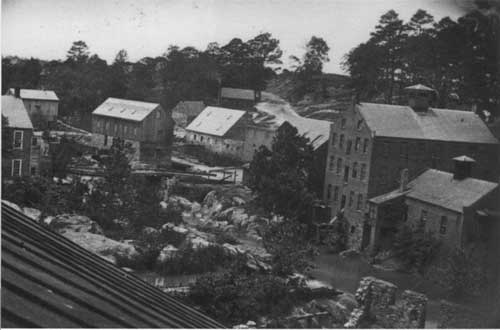
|
A COTTON MILL IN PETERSBURG, VIRGINIA. (LC)
|
The lack of food and material comforts became so severe that some
planters, to conserve supplies, simply turned slaves off the land. Mary
Stribling reported that by the time of Lincoln's Emancipation
Proclamation, her father had already warned slave women and children he
would resort to selling those who could not earn their own keep. Much of
the scarcity was a product of contributing to the Confederate cause, as
one Mississippi mistress explained: "My heart has yearned over our
brave, noble, bare-footed ragged young men, & have done all I could
in my limited way to meet their necessities. Our stock of cloth laid up
for the negroes is almost exhausted, having given suits of clothes to
the soldiers. We also have given hundreds of pairs of socks, the amount
of 500, I think to the Army. Some three or four weeks since we sent
twelve blankets, eight dozen pairs of socks, three carpet blankets, to
Genl. Prices Army."
Besides the endless shipping of supplies, plantations were expected
to host Confederate soldiers. Many gave generously to the anonymous sons
of the Confederacy who imposed on their hospitality. Rebecca Ridley
lived in the cook-house of her former plantation Fair Mont, outside
Murfeesborough, Tennessee, after Yankees burned her home. Following a
battle she reported: "The ground has been covered with snow and
ice—freezing our poor unprotected soldiers . . . poor fellows, how
my heart bleeds for them. They come in at the houses to warm, and get
something to eat, and some of our citizens who pretend to be very
Southern grudge them the food they eat—say they will be eat
out."
The burdens of contact with Yankees were unbearable to most southern
white women. Cordelia Scales, on her plantation eight miles north of
Holly Springs, Mississippi, reported a visit from the Kansas Jayhawkers:
"They tore the ear rings out of ladies ears, pulled their rings &
breast pins off, took them by the hair; threw them down & knocked
them about. One of them sent me word that they shot ladies as well as
men & if I did not stop talking to them so & displaying my
confederate flag, he'd blow my brains out." Amanda Worthington, also on
a Mississippi plantation, told of the 20,000 bales of government cotton
that went up in flames with over a thousand head of cattle and a
thousand head of hogs and ten thousand bushels of corn lost to pillaging
Yankees.
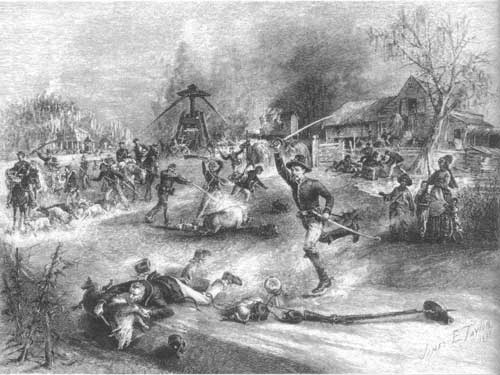
|
YANKEE TROOPS FORAGING ON A GEORGIA FARM. (BL)
|
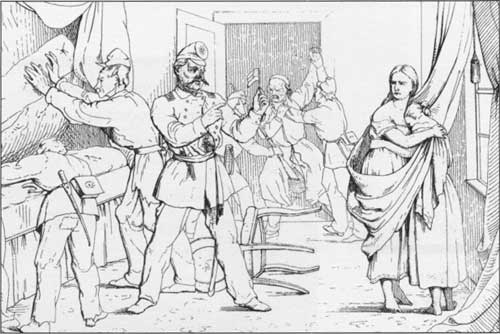
|
A SOUTHERN ARTIST CAPTURED A SCENE FREQUENTLY REPORTED IN MEMOIRS OF
YANKEE SOLDIERS TERRORIZING SOUTHERN CIVILIANS. (LC)
|
Sarah Huff, in northern Georgia, remembered that the "Yankees
stripped us bare of everything to eat; drove off all the cattle, mules,
horses; killed chickens; and turned their horses into a wheat field so
that what the horses could not eat was destroyed by trampling." Dolly
Lunt recalled a similar siege at her home near Covington, Georgia: "But
like demons they rush in! My yards are full. To my smoke house, my
dairy, pantry, kitchen, and cellar, like famished wolves they come,
breaking locks and whatever is in their way." Mary Stribling in Fort
Royal, Virginia, was appalled at Yankee conduct: "They came into the
house and searched it several times and stole various articles of female
apparel for which it is impossible to imagine what purpose they could
use them . . . they threatened the girls with the worst treatment. They
wrote all over the walls addressing the ladies as if they were writing a
letter, they write low pieces of obscenity to which they signed Jeff
Davis's name."
Some plantation houses in South Carolina and other regions proudly
display Yankee graffiti today to preserve the defilement of their homes
by soldiers who clearly weren't "gentlemen." Graffiti was a small
problem compared to shelling. Further, arson was an awful crime which
too many women witnessed. The savagery of this torching policy prompted
Henrietta Lee to write directly to Union commander, General David
Hunter:
"Yesterday your underling, Captain Martindale, of the First New York
Cavalry, executed your infamous order and burned my house . . . the
dwelling and every outbuilding, seven in number, with their contents
being burned, I, therefore, a helpless woman whom you have cruelly
wronged, address you, a Major General of the United States Army, and
demand why this was done . . . . Hyena-like, you have torn my heart to
pieces! For all hallowed memories clustered around that homestead; and
demonlike, you have done it without even the pretext of revenge . . . .
Your name will stand on history's pages as the Hunter of weak women, and
innocent children: the Hunter to destroy defenseless villages and
beautiful homes—to torture afresh the agonized hearts of
widows."
But not all contact with Yankees was as brutal and hellish. Sallie
Moore, a Virginian, reported that when a Union officer was inspecting a
woman's home when climbing up the stairs "suddenly a string broke and a
shower of spoons and forks came raining down the steps from under her
hoops." In this tense moment, the soldier gallantly stooped to help the
woman retrieve her silver, which he returned to her.
The testimony of southern blacks provides a powerful counterpoint to
Confederate memoirs, as former slave Eliza Sparks of Virginia confided
with special poignancy an encounter with a Yankee:
"I was nursin' my baby when I heard a gallopin', an' fo' I coud move
here come de Yankees ridin' up . . . . The officer mought of been a
general—he snap off his hat an bow low tome an' ast me ef diswas de
way to Gloucester Ferry Den he lean't over an' patted de baby on de haid
an' ast what was its name. I told him it was Charlie, like his father,
Den he ast, 'Charlie what' an' I told him Charlie sparks. Den he reach
in his pocket an' pull out a copper an' say, 'Well, you sure have a
purty baby. Buy him something with this; an' thankee fo' de direction.
Goodbye, Mrs. Sparks.' Now what you think of dat? Dey all call me 'Mrs.
Sparks!'"
The slave presence was a trouble some issue for Confederate
civilians. African Americans were both potential enemies as well as
desperate allies within the plantation South. White women ironically
might despair both over slaves running away and over slaves remaining
behind to be looked after during federal invasion.
In the rich plantation region along the Combahee River in South
Carolina, Union commander David Hunter, assisted by the intrepid scout
and spy Harriet Tubman, recruited over 800 black soldiers during summer
raids in 1863. By rousting slaves from their owners, spreading fear and
mayhem in this and other successful operations, the North was able to
wreak havoc with the plantation system—most effectively in the
Mississippi Valley during the fall of 1863, when nearly 20,000 slaves
deserted masters to join the Union army.
These forms of open rebellion were not as common as daily resistance.
The enemies within came to represent as much of a threat to plantation
productivity as invading foes. White southerners failed to grasp this
reality until very late in the war. Indeed, by the time the tide had
turned, some masters were forced to encourage slaves to run
off—deprived of any means of feeding a dwindling work force.
Especially in the battle-torn Virginia countryside, planters might
record the number of runaways on a daily basis while northern troops
crisscrossed the country.
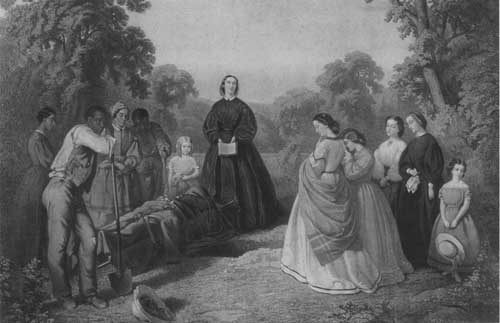
|
BURIAL OF LATANÉ BY WILLIAM WASHINGTON (1864). WHEN THIS
PAINTING WAS FIRST PUT ON DISPLAY, VIEWERS IN RICHMOND DROPPED COINS IN
A BUCKET PLACED IN FRONT OF IT. TOUCHED BY THE THEME OF SACRIFICE. (MC)
|
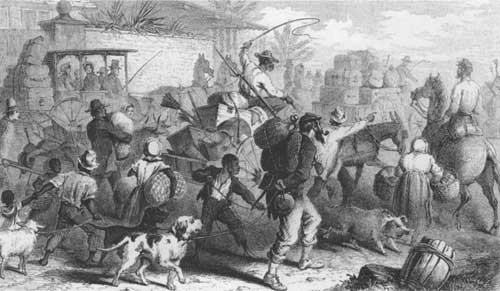
|
ESCAPING CHARLESTON WITH THE THREAT OF UNION OCCUPATION. (LC)
|
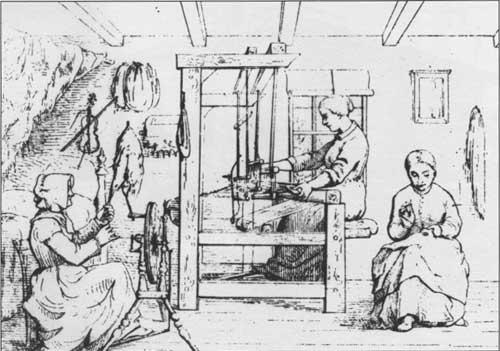
|
SOUTHERN HOMEMAKERS MANUFACTURING CLOTHING. (LC)
|
Many black youth on plantations initially found the whole idea of war
exotic and intriguing. Rachel Harris recalled, "I went with the white
chillun and watched the soldiers marchin'. The drums was playing and the
next thing I heerd, the war was gwine on. You could hear the guns just
as plain. The soldiers went by just in droves from soon of a mornin'
till sun down." But soon, the depletion of adult labor increased the
burdens on slave children. Henry Nelson, only ten years old when the war
broke out, remembered, "You know chillun them days, they made em do a
man's work." Eliza Scantling, fifteen in 1865, remembered she "plowed a
mule an' a wild un at dat. Sometimes me hands get so cold I jes'
cry."
For slave children the prospect of an invading enemy was confusing
and, at times, terrifying.
|
For slave children the prospect of an invading enemy was confusing
and, at times, terrifying. One slave remembered being told by the
overseer when the slave was only ten years old that Yankees had "just
one eye and dat right in de middle of the breast." Mittie Freeman, also
ten, hid in a tree when the first bluecoats arrived. There is ample
evidence to demonstrate that black children overcame apprehensions and
even became enamored of Union soldiers in many instances. Although they
might empathize with the adults' sense of jubilation over impending
freedom, at the same time they were children, overwhelmed and frightened
by the prospect of any change. Additionally, carnage was close at hand,
and many slave children witnessed frightening results. James Goings,
only three when war broke out, recalled that by the end of the war "it
wuzn't nuthin' to fin' a dead man in de woods."
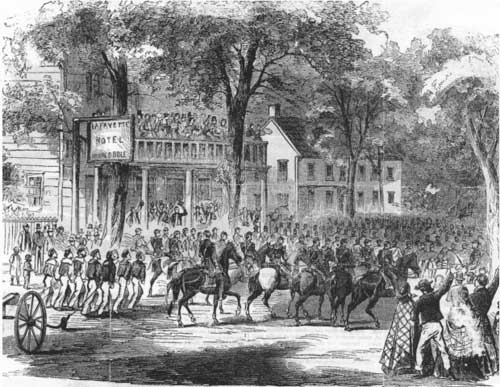
|
IN TOWNS LARGE AND SMALL THROUGHOUT THE SOUTH. CITIZENS WOULD PROUDLY
CHEER FOR THEIR BOYS MARCHING OFF TO WAR. (HARPER'S WEEKLY)
|
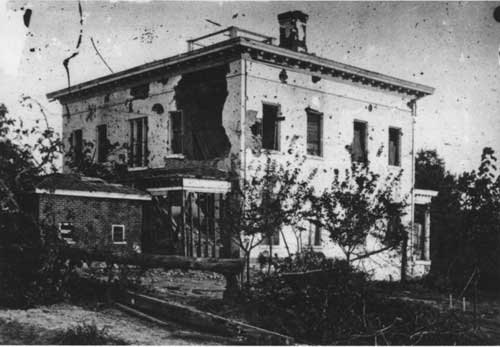
|
AN ATLANTA MANSION, SCARRED BY SHELLING. (LC)
|
Many black children sacrificed parents as well to the terrible
conflict. As slave men fled the plantations, leaving wives and children
behind, thousands were fatherless and hundreds were orphaned. Amie
Lumpkin of South Carolina recalled her wartime loss: "My daddy go 'way
to de war 'bout distime, and my mammy and me stay in our cabin alone.
She cry and wonder where he be, if he is well or he be killed, and one
day we hear he is dead. My mammy, too, pass in a short time." Slave
children made their unwilling offerings, too.
The southern cult of sacrifice began on a rather high note of
camaraderie and fellowship within the Confederacy. Parthenia Hague
described the way women in the Alabama countryside would gather for
spinning bees: "sometimes as many as six or eight wheels would be
whirring at the same time." Hague was heartened by these efforts, but
another confided, "Slowly but surely the South was 'bled white.'
Luxuries, there were none." The search for necessities preoccupied most
southern housewives, and one girl in Winchester complained: "Out shopping
all morning. I'd give a cent if Jennie Baker would quit sending for
me to buy things for her. Its the bane of my existence for every store
here in town is bare and nothing you want in there. Here today I walked
all over town and couldn't get anything I wanted."
Pooling resources was a game that may have been a festive ritual
early in the war, but by 1862 scarcity was worrisome, and by the summer
of 1863 inflation and rationing made putting food on the table a major
ordeal. Lucy Johnston Ambler fretted in summer 1863: "Indeed everything
looks very gloomy. From having a comfortable table, I am reduced to
bacon bone . . . I have a very sick grandchild and several servants sick
with no suitable medicine." These stories were kept from menfolk away at
war.
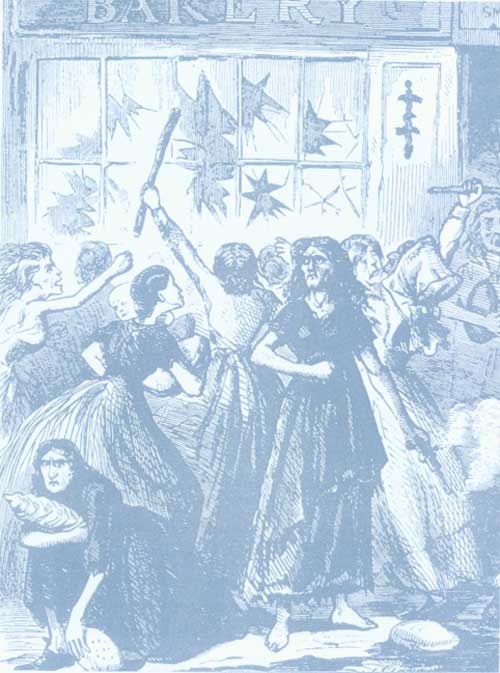
|
A NORTHERN ARTISTS STARK IMAGE OF THE RICHMOND BREAD RIOT. (FL)
|
Women's sacrificial courage was summarized by Louisa McCord Smythe:
"We would have died before we would complain to a man in the army. They
had enough to bear without that." But after several seasons of war, no
amount of sanitation could prevent soldiers from knowing the dire
straits on the Confederate home front.
The constant cry for salt and bread echoed from the banks of the
Shenandoah to the Delta and boomeranged back to the Confederate capital.
A woman in Richmond wrote to a friend on April 4, 1863, in the wake of
civil disturbances. She repeated the words of a young girl: "We are
starving. As soon as enough of us get together we are going to the
bakeries and each of us will take a loaf of bread. That is little enough
for the government to give us after it has taken all our men." Nearly a
thousand women and children banded together and "marched along silently
and in order." They methodically emptied stores of goods and refused to
stop even when the mayor confronted them to "read the Riot Act." The mob
even ignored the city battalion. In desperation, Jefferson Davis
appeared. The Confederate president was at first greeted with hisses,
"but after he had spoken some little time with great kindness and
sympathy, the women quietly moved on, taking their food with them." But
over forty-eight hours later, an observer reported, "Women and children
are still standing in the streets, demanding food, and the government is
issuing to them rations of rice."
All of northern Virginia was alarmed by the Richmond Bread Riot and
spread the word. One woman confided, "I am telling you of it because
not one word has been said in the newspapers about it." People
throughout the countryside certainly understood the impulse. Virginia
Cloud of Fort Royal complained, "I do not think the speculative spirit,
so prevalent, is at all patriotic. I fear there are many who love
mammon more than their country." There is evidence of widespread
scapegoating during this period, and Jewish merchants in the Confederate
capital were targeted by unhappy civilians. Government censorship
suppressed news of such disturbances, but these incidents erupted
spontaneously throughout the South.
Feeding the Confederacy and keeping the economy going was an
increasingly impossible task. Women were reduced to dreams and wishes.
Without food, without money, many women were perilously close to the
abyss. Sarah Rice Pryor, a refugee outside Petersburg, gave birth during
a blizzard over Christmas 1863. Mother and newborn were still bedridden
three months later when her husband sought her out and found his wife
and three children abandoned by the maid and being cared for by a hired
hand. The furloughed soldier, in shock at the crumbling state of
affairs, sold goods to raise cash to care for his wife. It was his
desire that she never "again fall into the sad plight in which he had
found me."
From the war's opening hours on through to the end, Confederates
employed dramatic religious rhetoric. A girl wrote to her cousin from
South Carolina: "This is indeed a terrible war. How many hearts have
been made desolate by its ravages. How many vacant places around the
family altars. How terrible is the wrath of God, our sins as a people
has brought this upon us and we should humble ourselves before Him. I
believe that Genl. Jackson was taken from us because we were making a
god of him, not for any sin or unrighteousness in him, for I believe
that he was not only doing good work as a soldier of our Confederacy but
also of the cross." Jackson was indeed worshiped and revered during his
military career. After death, he became a martyr and after the war
canonized as part of the Confederate trinity: Davis, Lee, and
Jackson.
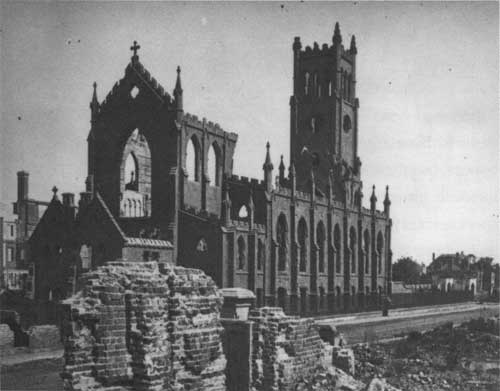
|
A BOMBED-OUT CHURCH IN DOWNTOWN CHARLESTON. (LC)
|
Christian faith gave these women their redemption as well. They
struggled mightily to find some sense of the slaughter, to the endless
drumbeat of defeat. Eliza Andrews, after a visit to Andersonville
Prison, worried about vengeance: "I am afraid that God will suffer some
terrible retribution to fall upon us for letting such things happen. If
Yankees ever should come to South-West, Ga . . . and see the graves
there, god have mercy on the land." This prophecy of doom perhaps came
true in the form of William T. Sherman. Almost all white southerners
recast Sherman's March as God's test of their faith. When Sherman's
troops set off from Atlanta to Savannah, his men began in an orderly
fashion, especially the first ten days, covering 275 miles. But after
they reached Camp Lawton, a prisoner of war camp at Millen, many of the
lawless brutalities emerged which made this campaign infamous.
Another severe test of faith came for many Confederates during the
prolonged campaign to control Vicksburg, when thousands were caught up
in the battle over this key port. This linchpin city on a bluff
overlooking the Mississippi River had been the focus of federal military
strategy for months. Union General Ulysses S. Grant finally gathered
70,000 to assault the CSA force of 28,000 in the summer of 1863. Before
surrender, the besieged Confederates would be reduced to eating horses,
dogs, and rats. The bombardment was so fierce that civilians dug caves
into the mountainside for shelter. The memoir of Mary Ann Loughborough
documented the genuine hardships of civilians. Loughborough recalled an
incident when a shell lobbed into the center of a cave, crowded with
families: "Our eyes were fastened upon it, while we expected every
moment the terrific explosion would ensue. I pressed my child closer to
my heart and drew nearer to the wall. Our fate seemed almost certain;
and thus we remained for a moment with our eyes fixed in terror on the
missile of death, when George, the servant boy rushed forward, seized
the shell, and threw it into the street, running swiftly in the opposite
direction." Both George and the cave dwellers escaped injury.
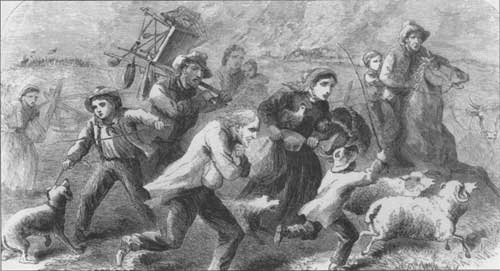
|
TERROR IN THE GEORGIA COUNTRYSIDE AT THE APPROACH OF UNION GENERAL
WILLIAM T. SHERMAN. (LC)
|
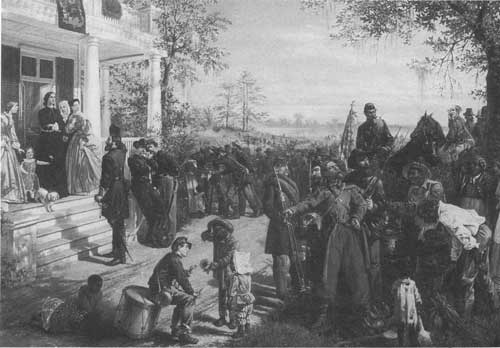
|
SHERMAN'S MARCH TO ATLANTA BY THOMAS NAST. THIS PAINTING DEPICTS
SLAVES GREETING FEDERAL SOLDIERS WHILE THE PLANTATION OWNERS LOOK ON
DISAPPROVINGLY. (COURTESY OF SOTHEBY'S)
|
Nerves frayed, supplies disappeared, and the determined Yanks
maintained their attack. Scurvy, mule-skinning, and bombardment chipped
away at morale. Wounded animals limped around looking for grass, evading
butchers. Nightly shelling kept frightened children awake. The
challenges were tremendous and daily life was precarious at best and,
upon occasion, deadly.
Loughborough recalled a particularly awful day when one of the young
girls, bored by confinement, ventured out: "On returning, an explosion
sounded near her—one wild scream and she ran into her mother's
presence, sinking like a wounded dove, the life blood flowing over the
light summer dress in crimson ripples from a death wound in her side
caused by the shell fragment. A fragment had also struck and broke the
arm of a little boy playing near the mouth of his mother's cave." She
recalled the frequency of heartwrenching "moans of a mother for her dead
child."
After countless dead, the Confederates hoisted the white flag on July
4, 1863. The soldiers were placated by the dignity they were accorded. As
the half-dead men stacked their arms, witnesses detected a note of
sympathy from their Union conquerors. The treaty, concluded on a federal
holiday, contained generous terms and nearly all soldiers were
paroled.
|
LIFE IN VICKSBURG
Mary Jane Sitterman was visiting her quartermaster husband in
Vicksburg when she got trapped by the advancing Union army closing in on
Vicksburg from the east. She became a cave dweller during the siege and
left the following account:
"We ... fitted the cave with the articles of housekeeping and were
comfortably fixed. Our beds were arranged upon planks that were elevated
on improvised stands, planks covered the ground floor, and these in turn
were covered with matting and carpets. The walls surrounding the beds
were also covered with strips of carpets, so all possible dampness was
by a little care entirely eliminated. The wall carpeting was made
adherent by small wooden pins or stobs."
Gordon Cotton, director of the Old Courthouse Museum in Vicksburg,
relates the following in his Vicksburg: Southern Stories of the
Siege (Vicksburg, 1988):
"Dora Miller noted that dogs and cats virtually disappeared from the
streets and wondered where they went. In The Daily Citizen,
Editor J. M. Swords described a dinner for eight shared by friends 'a
delicious and featured rabbit' stew. He also pointedly mentioned that
the cats had simultaneously disappeared and declared the felines of the
city were an endangered species."
—Michael Ballard
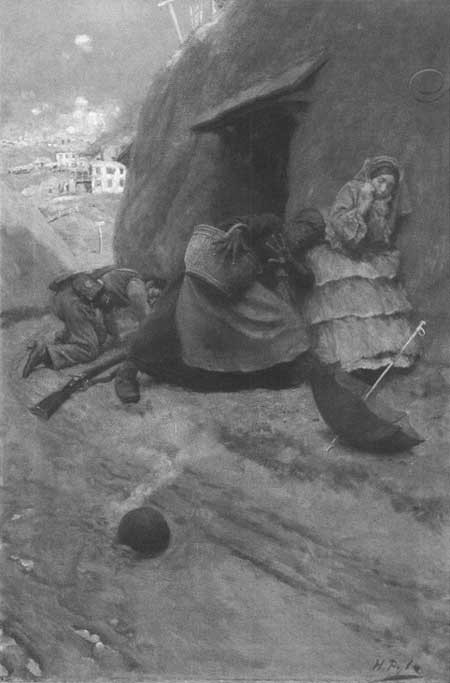
|
THE SHELL BY HOWARD PYLE, 1908 (MR. AND MRS. HOWARD P. BROKAW,
PHOTOGRAPH COURTESY OF THE BRANDYWINE RIVER MUSEUM)
|
|
The defeat at Vicksburg and almost simultaneous Union victory at
Gettysburg (with 15,000 casualties out of the 60,000 rebels engaged)
seemed a dress rehearsal for the final surrender in April 1865. Many
women by this fateful time sensed the doom on the horizon and began,
consciously or unconsciously, to contemplate surrender. They continued
to consolidate their own position as women worthy of Greek tragedy;
indeed, one woman writer composed such a narrative with her novel:
Augusta Jane Evans's Macaria; or Altars of Sacrifice (1864). From
this turning point in July 1863 to the treaty at Appomattox, hundreds of
thousands were refugees, hundreds of thousands were
wounded, and tens of thousands were buried. As they hoped and prayed for
the final battle, few could contemplate life beyond war's end, afraid to
anticipate the outcome.
|
|
